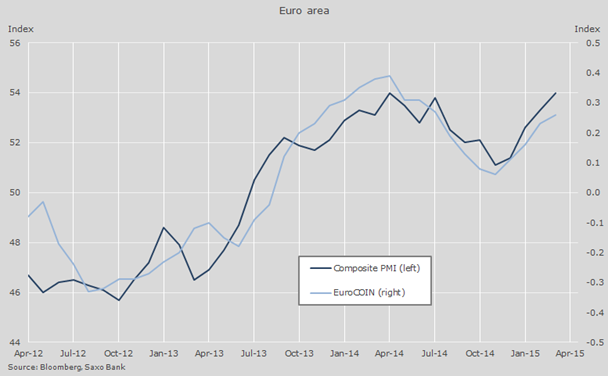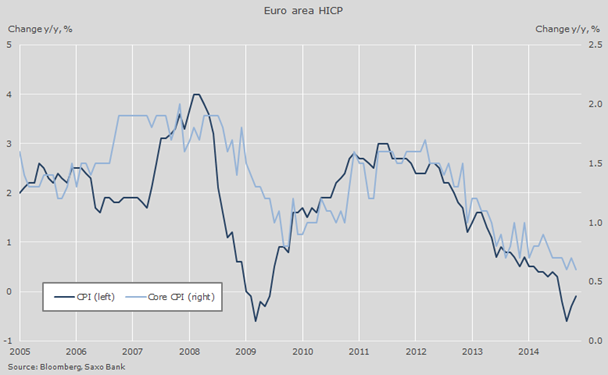- Improving EU outlook leads some to question QE
- Low oil prices will likely keep pressure on inflation
- Private sector lending growth remains modest
- The three key ECB policy rates will be left untouched implying a main refinancing rate of 0.05% and a deposit rate of minus 0.2%.
- ECB president Mario Draghi will highlight that the economy is improving ...
- ... but also that inflation will remain very low going forward, and will only gradually rise towards the ECB's target rate.
- Draghi will stress that the QE programme will run as scheduled and its continuation is needed for a positive impact on inflation expectations.
- He will also emphasise that the ECB will not struggle to find enough bonds to buy (the ECB achieved its March quota of €60 billion by buying some 47bn in government bonds and the rest in ABS and covered bonds).
Market focus will centre on Frankfurt and the European Central Bank on Wednesday when the governing council meets for the third time this year. A healthy uptick in economic activity in the euro area has resulted in a situation unthinkable just a few quarters ago, with some questioning whether the ECB's quantitative easing programme should end earlier than scheduled (September 2016).
Yves Mersch, the Luxembourgian member of the governing council, speculated last week that a faster-than-expected return to target inflation could see the ECB speed up its QE exit.
One indicator confirming the improved fortunes of the Eurozone is the Composite PMI, which averaged 53.3 in Q1 following 51.5 in Q4. This corresponds to quarterly GDP growth of at least 0.3% though we have to wait a while for the actual figure with the Q1 GDP report scheduled for release on May 13.
A broader aggregate monthly measure of activity, the EuroCOIN, is also in an uptrend since a trough in November of last year, printing 0.26 in March – the highest reading since July 2014.
Economic activity may be on the rise, but talk of an early end to QE is very premature in my view, as inflation remains very low. Consumer prices were mostly unchanged in March from a year ago (minus 0.1%, according to the preliminary report) while core prices rose a modest 0.6%.
There are reasons to remain sceptical of a quick return to higher inflation: First, low energy prices continue to exert downward pressure on inflation, and we do not see oil prices picking up substantially in the coming quarters – the supply, both actual and potential, is simply too great (see page 7f).
Second, private sector lending growth remains modest despite the uptick in the economy as consumers continue to deleverage (household lending fell 0.8% year-over-year through February). Third, slack in the labour market remains substantial. The unemployment rate stood at 11.3% in February, and while that hides large discrepancies across countries (e.g. Germany's UR is 4.8%), it nevertheless implies that overall wage growth will stay muted.
With these developments in mind, we look for the following at the ECB meeting (the rate announcement is at 11:45 GMT followed by the press conference at 12:30):
— Edited by Michael McKenna
Mads Koefoed is head of macro strategy at Saxo Bank.
